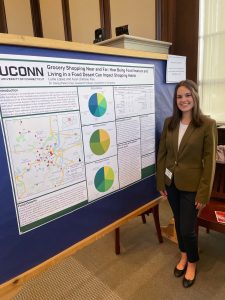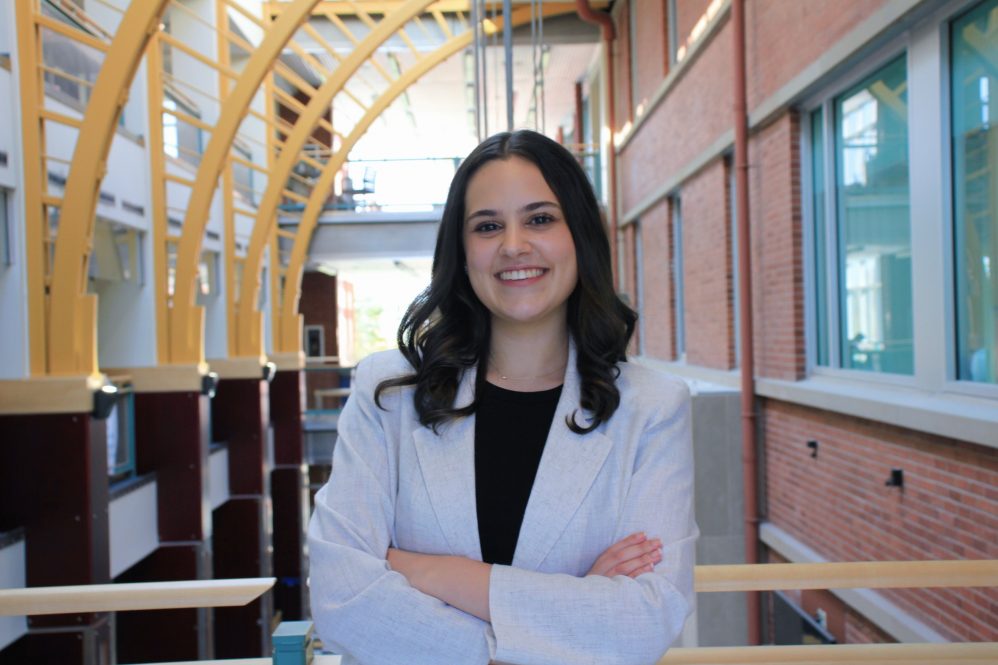Growing up in Avon, Conn., Lucie Lopez would occasionally accompany her mother to her workplace, a community health center in Hartford. By the time she reached high school, she had developed a vocabulary to describe the differential nutrition-related health outcomes she witnessed in communities across the state: food deserts, food insecurity, correlations between carbohydrate consumption and chronic illness.
“At the time, I wasn’t sure if I wanted to pursue psych or if I wanted to pursue something more healthcare-related,” Lopez says. “I thought looking at food was kind of a good middle ground because it wasn’t too STEM-y, and it also allowed me freedom to be creative.”
For her high school capstone project, she solicited friends and family to record everything they ate for a week and used their reports to generate revamped, healthier meal plans with similarly accessible foods. Her finished project included a hearty helping of nutritional background information based on an interview she conducted with a Hartford-based dietitian, delving into the history of current American diets and the deep-rooted social issues that impact access to healthy foods.
Armed with a greater understanding of health principles and long-form research than many first-year students, Lopez was ready to hit the ground running when she arrived at UConn in 2021. Beginning in her second semester, she spent a year working in the Social and Emotional Development Lab of Rhiannon Smith in the department of psychological sciences.
“That was a really great first experience – I got to learn a lot about recruiting participants and data cleaning,” she says.
After finishing her first year at UConn, Lopez recalls, “I wanted to get kind of a different research experience and explore more of that food insecurity that I looked at in high school, because it was still lingering on my mind.”

She applied for a summer apprenticeship through the Social Sciences, Humanities, and Arts Research Experience (SHARE) program offered by the Office of Undergraduate Research. Drawn by the prospect of combining her past research experiences in food insecurity and her newfound studies of psychological sciences, she joined the lab of Peter Chen in the department of geography for a project on food insecurity. The research focused on examining food perceptions and habits like grocery shopping and eating out at restaurants, particularly in the Hartford area.
Today, as a third-year student on track to graduate this spring, Lopez is conducting independent research supported by the UConn IDEA grant program. Her current project centers on how participation in a free or reduced school meal program impacts students’ (particularly adolescents’) sense of belonging at school.
The project entails two major parts: a retrospective study with current college-aged people who participated in free and reduced meal programs during their K-12 education, and a study with current parents/guardians of students (especially in 9th-11th grade) who participated in free and reduced meal programs before, during, and after the COVID-19 pandemic.
Those parents “have seen that whole progression,” Lopez explains: “First, you had to qualify; then, during COVID, there was a lot of relief funding; now that funding money has kind of run out. So I’m interested in seeing how those different kinds of support systems played into changing the sense of community in the school and changing the sense of belonging for the students.”
Despite a busy schedule packed with research and coursework, Lopez finds the time to give back to other undergraduates, working with the organizations that first supported her. Lopez is a Peer Allies Through Honors (PATH) Mentor for the UConn Honors program, where she advises incoming Honors students and helps with their transition to UConn. She’s also a First-Year Experience (FYE) Teaching Assistant, leading a class of 12 peer mentors as they themselves support first-year students, and a student coordinator for UConn Community Outreach, where she oversees teams of student volunteers as they conduct language and literacy outreach programming in K-12 schools. This year, along with her IDEA grant experience, she has joined the OUR as a Peer Research Ambassador, where she provides direct support to other undergraduate researchers and shares her own experiences.
“A lot of the people that I do advising sessions with are interested in the IDEA grant program or potentially pursuing their own kind of creative project, and I love hearing about where people are taking their previous interests and projecting them to the future,” Lopez says.
After graduating with her BA in psychological sciences and Spanish, Lopez hopes to pursue her PhD in school psychology and continue to explore how the discipline can support all aspects of the student experience. Community, belonging, and emotional wellbeing are all key parts of overall student wellness which Lopez believes can be better supported with research like hers.
“With my research, I really want to bring in that lens of ‘How can the whole school community support students – and not just on the academic side?’” she says. “Because in school they do academics, but they also connect with teachers and peers, and they have those more social times of lunch or extracurriculars that can really influence them because they are a big part of their day.”
As she continues her research career, Lopez hopes to find even more ways to marry her interests in nutritional equity and school psychology – which has so far proved a fruitful intersection.
“I really want to continue the research that I’m doing and adding to that literature of supporting students socially and emotionally,” she says, “and using that research to potentially inform policy.”



